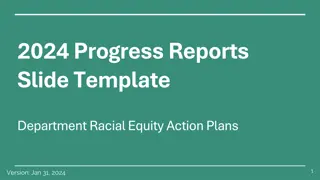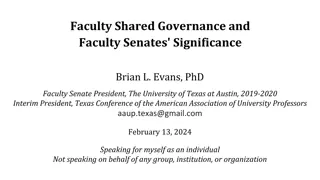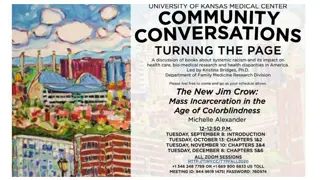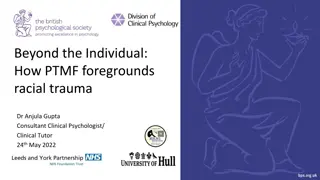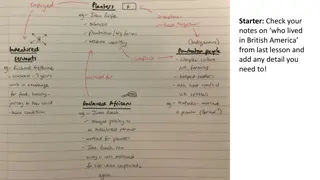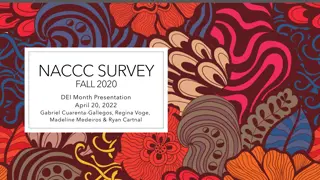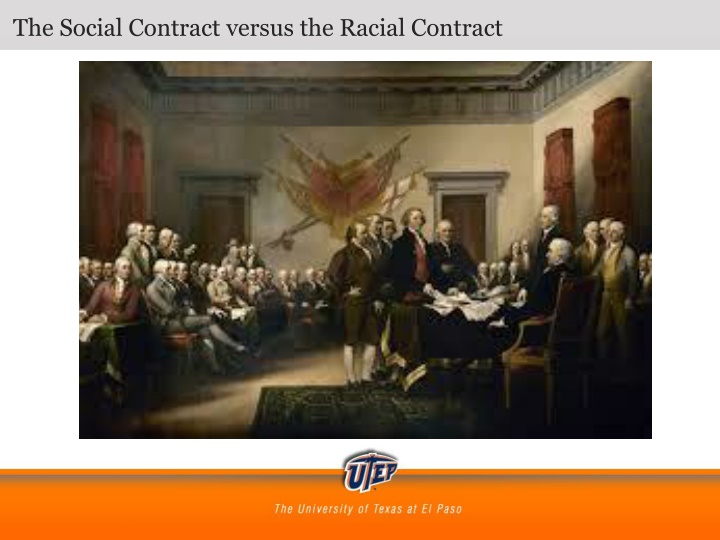
Exploring the Social Contract versus the Racial Contract in Governance
Delve into the implications of the social contract theory based on popular consent, contrasting it with the reality of the racial contract that excluded marginalized groups from equal rights and governance. Uncover the historical context and theoretical foundations shaping these contrasting contracts in political philosophy.
Uploaded on | 1 Views
Download Presentation

Please find below an Image/Link to download the presentation.
The content on the website is provided AS IS for your information and personal use only. It may not be sold, licensed, or shared on other websites without obtaining consent from the author. If you encounter any issues during the download, it is possible that the publisher has removed the file from their server.
You are allowed to download the files provided on this website for personal or commercial use, subject to the condition that they are used lawfully. All files are the property of their respective owners.
The content on the website is provided AS IS for your information and personal use only. It may not be sold, licensed, or shared on other websites without obtaining consent from the author.
E N D
Presentation Transcript
The Social Contract versus the Racial Contract Governance is often based upon the political theory of the social contract Derived from political theorists: Hobbes, Locke, Rousseau, Kant https://www.youtube.com/watch?v=glgU6o4nZQc The social contract provides foundation of governance based upon the popular consent of individuals, who are taken as equals The social contract is the basis of Declaration of Independence and Constitution, eg. We the People
The Social Contract versus the Racial Contract The social contract includes both a political contract and a moral contract Starts with the state of nature Includes subsidiary contracts: Moral contract = to establish society =moral code to create society, as distinct from state of nature morality transforming natural man to civil/political man Political contract = to establish a state (i.e., sovereign government authority) = transfer or delegation of peoples rights in state of nature to a governing entity
The Social Contract versus the Racial Contract But history has made clear that not all individuals were equal or included in that social contract, including women, enslaved Africans, and Indigenous Peoples They had no say in the foundation of government nor gave their consent to be governed, and they were not provided the same rights and obligations as white men So We the People excluded yet governed large proportions of people while simultaneously allowing for enslavement, genocide, and violations of human rights Perspective: https://www.youtube.com/watch?v=HOktqY5wY4A
The Social Contract versus the Racial Contract This discrepancy between the ideal social contract (we are all equal) and reality (actually we re not all equal) is accounted for by the racial contract, from Charles W. Mills The racial contract suggests that the inner logic behind these discrepancies is that of white supremacy, where the racial contract is a contract of exploitation Moral, political, and legal rules normally regulating the behaviors of white male settlers in their dealings with each other either does not apply, or applies only in qualified form, to non-white people and women Purpose of racial contract is the differential privileging of white people (men) as a group with respect from nonwhites and women, as a group, where the later can be exploited for their bodies, land, and resources and denied socioeconomic and political opportunities The creation of society required the intervention of white men, who were already sociopolitical beings rather than the savage nonwhite natives, who are presumed incapable of self-rule and and civilization
The Social Contract versus the Racial Contract The racial contract thus implies that the polity created by the social contract is also a racialized polity or racial state, where the status of whites and nonwhites is clearly demarcated by law and/or custom Purpose of this racial state is to maintain and reproduce this racial order, securing full privileges and advantages for white citizens while subordinating nonwhites Same across gendered groups as well so as to maintain patriarchal systems Achieves these goals through coercion, particularly violence and ideological conditioning (i.e. internalization) Thus, race was not an afterthought or deviation from the social contract. Racism was the central shaping feature.
The Social Contract versus the Racial Contract The racial contract is continually being rewritten to create different forms of racial policy Eg. Enslavement -> Jim Crow -> colorblindness Colorblindness: racelessness itself is a racial act Policies of colorblindness do not themselves eliminate disparities. Rather they pretend a neutral baseline (that often does not exist due to long-term effects of policies related to colonization, enslavement, and discrimination) and make the causes of racial disparities increasingly hidden (so race and racisms are simultaneously everywhere and nowhere as the invisible writing undergirding systems) Perpetuates and hides racism and discrimination within presumably neutral or objective metrics and processes
The Social Contract versus the Racial Contract Even today, white individuals are beneficiaries to racial contract, though not all white individuals are signatories to it Rejection of the racial contract is to speak out and struggle against the terms of the contract Accepting the privileges of whiteness, normed inequities, and racial hierarchies is to consent to the racial contract Remember that whiteness is continually redefined and not actually a color but rather is a set of power relations Complicity is consent Racial contract can be considered global, with the realities of European domination (and colonization) of global political and economic systems
The Social Contract versus the Racial Contract So the basis of American government and governance is based upon the social and racial contract(s), formally codified into law and policy and informally regulated through norms and customs Including the American Constitution
Resources Mills, Charles W. 1999. The Racial Contract. Cornell University Press.


